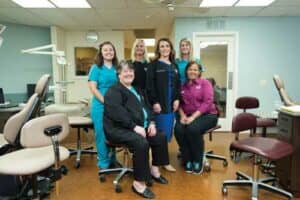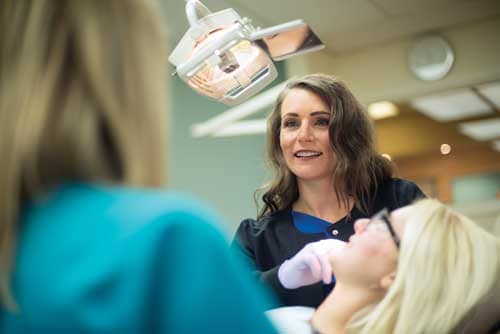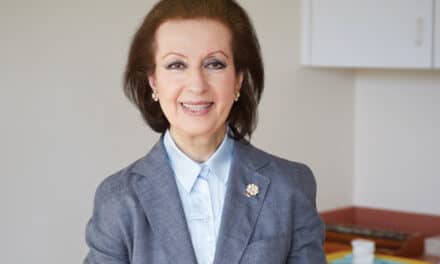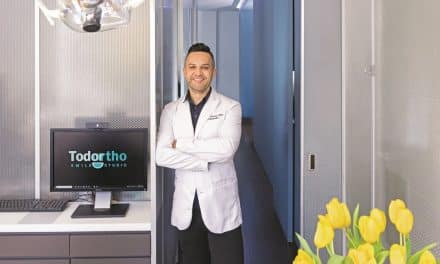Becoming a dentist or orthodontist was always in the back of Jennifer Berwick’s mind, but she took a very roundabout path to get to where she is today.
Her father was an oral surgeon, so she grew up around the industry, but wasn’t certain she wanted to dive head-on into dentistry in school.
When Berwick, now 36, was heading to college at the University of Colorado-Boulder, she wasn’t sure quite what to study. But advice from friends and family all pointed to pursuing the path into business.
“They said business would be a great background to have even if I did ever decide to go into a dental field,” Berwick says.
So she took medical and dental courses while also working toward her finance degree, which yielded immediate benefits. She was offered a 2-year contract position as an analyst at Citigroup’s investment bank, Solomon Smith Barney, in New York City, upon graduation from college.
[sidebar float=”right” width=”200″]
Check out our podcast on the changes facing the orthodontic industry, and to hear more from Berwick. Click here to listen now. [/sidebar]
That’s where Berwick’s eyes were opened to the massive implications of the finance industry’s inner workings. She spent her days working with companies in the world of mortgage-backed securities about 5 years before the subprime mortgage crisis. She didn’t always love the topic, but she loved the fast-paced environment.
But, while she enjoyed learning about the fascinating, complex world of finance at Citigroup, she started to find herself longing to work one-on-one with patients and help people individually in a way she could really see.
Rather than staying on Wall Street and finding another finance job once her initial contract with Citigroup wrapped up, Berwick headed to New York University (NYU) College of Dentistry in the fall of 2003 to finally set out on the career path she had long envisioned. But her time in finance was hardly an inconvenient detour. She has been able to parlay her business background into running a thriving private practice, Family Orthodontics of Charleston, in Charleston, SC.
The Early Years
While living and working in New York City afforded Berwick a lot of opportunities, those first 2 years in the city were rather tumultuous.
From her apartment in the Financial District, just south of Tribeca, she was able to see the World Trade Center towers fall on September 11, 2001. She had just arrived in New York that summer.
“I was there for when the planes hit and also the aftermath of what happened in the stock market,” she says. “At the time, there wasn’t anything between my apartment and the towers. That was really just a sad place to be.”
Her apartment was so close that she had to be evacuated for 2 weeks to avoid the enormous dust cloud that encapsulated much of lower Manhattan.
But her relationship with the city had been forged, and she opted to stay for dental school. However, her orthodontic residency would take her down south to the Medical University of South Carolina in Charleston in 2007.
Berwick was used to landing and starting over in new places. Growing up in a military family, she was born in Germany and lived there on two separate occasions. She also called Washington and Texas home for a time before her father retired to Colorado Springs, Colo.
And she returned to Colorado—which she calls her “original home”—following her residency.
Berwick joined an established practice as an associate, with the thought that this relationship would lead to something. But like her 2 years in finance, her associateship wasn’t the right fit either. While she gained valuable experience as a new orthodontist seeing patients and learning about the workflow of a busy, well-run practice, she wanted to have a more integral role in any practice she worked in. So, again, Berwick found herself looking for a new place to land after 2 years in Colorado.
During her residency, Berwick had met her husband in Charleston and that was where she returned to take the next step in her professional career.
 Adapting to the Market
Adapting to the Market
Upon arriving in Charleston in 2012, Berwick purchased an established practice with two locations from an orthodontist who was retiring. When she bought her practice, she had a firm grasp on how to finance that big purchase and balance it with her student loan debt. That led to getting creative about financing some of the initial costs of starting a business and making sure she didn’t get in over her head.
Berwick shopped around aggressively for the lowest interest rates she could find and took out a home equity line of credit.
“I really looked at several different opportunities to buy the practice and made the decision not to stretch myself too far in buying a practice that was overpriced,” she says. “I could still treat the patients I wanted to treat and not make decisions weighing overhead costs versus being comfortable.”
Buying an existing practice allowed Berwick to cover costs while also growing and updating the business from day one. At the same time, Berwick took up an offer from a dental school friend in Atlanta. That friend was working for Dentistry for Children (D4C), a corporate dental group specializing in pediatric dentistry, which was looking for an orthodontist for one of its Atlanta offices, some 5 hours away from Charleston. Berwick decided to join the office to give herself greater financial security, splitting her time between Charleston, where she worked in her private practice Mondays, Tuesdays, and Wednesdays, and Atlanta, where she worked in the D4C office on Thursdays and Fridays.
When D4C moved into the Charleston market to open a number of pediatric dentistry locations a couple of years later, they approached Berwick to help them grow the orthodontic side of their business since they knew she already had an established private practice. Having worked with D4C in Atlanta, she was familiar with how they practiced, their corporate philosophy, and operations—making the decision to bring her own private practice under the D4C umbrella a year ago an easy transition and, as she saw it, a smart business move. While she remains the owner of her practice, the partnership allows her to better compete in the local market.
Since entering the Charleston market, Berwick had seen how most of the pediatric dentists in town were pairing up with an orthodontist—creating a one-stop shop for patients and parents with busy lives. As a result, referrals of children—that much needed population to grow a stand-alone orthodontic practice—were hard to come by.
By partnering with D4C’s pediatric dentists, Berwick is able to stay competitive and grow, while also spending more time with younger patients, something she really enjoys.
“My preference is working with orthodontics and pediatrics together as much as possible,” she says
While Berwick’s ties to D4C might imply a kid-focused practice, her practice maintains a strong adult population—about 40%. Berwick is confident these numbers will remain strong as she builds a network of parents who provide referrals to friends, family, and co-workers. And the partnership with D4C has not precluded her from partnering with other independent dentists in the area to offer orthodontic care. Still, to grow, Berwick knew she needed the number of children in her practice to increase—and pairing with pediatric dentists in a specialty practice like D4C gives her that ability.

“I think the majority of my patients are looking for quality orthodontics in an environment where they can feel comfortable and that is what we are able to provide, along with flexible and affordable financing options,” she says.
The partnership with D4C definitely helps Berwick’s practice keep its costs down. The reality is a corporate group like D4C enjoys a better buying capacity than a private practice does. This means supplies, advertising, and continuing education cost less. And while enjoying a better profit margin, Berwick is also able to offer patients lower prices.
Earlier this year, Berwick also partnered with Fred Gunter, DDS, another local orthodontist who works part-time and sees patients at the company’s North Charleston office. As Gunter, who is retiring, transitions out, Berwick is able to further grow the orthodontic side of her practice.
Financial Insight
Whether Berwick is thinking about the day-to-day running of her practice, or the future, her background in finance informs her decisions. Without that 2-year detour into investment banking, she believes her direction would be much less clear.
“I think it has helped tremendously,” she says. “When I start thinking about how to run the practice, and how we practice from the business side, I understand why some decisions are made. I understand the competitive landscape of things.
“I think [this knowledge] is something that is lacking for a lot of those who enter a practice—knowing what’s necessary to start a small business. Orthodontics has become a really competitive industry. [There’s] a lot to learn while also starting a small business.”
But even when orthodontists get help in learning the business side of the practice, it might not be enough unless they really have an interest in learning, she believes.
Customer service, outlining a conservative budget, and being cautious when addressing the perceived need to always have the latest and greatest technology are all things Berwick says she would recommend to orthodontists wanting to maintain better control of their practices.
Even when orthodontists do all of these things right, though, they may still struggle to keep a practice afloat.
As Berwick sees it, buying an existing practice is far and away becoming the most popular route for new orthodontists who want to own or co-own a private practice, as opposed to building their own.
But as it becomes tougher to survive as a private practice, she thinks partnerships with larger corporate groups like D4C are where the whole industry is headed.
“That’s unfortunate in some ways,” she says, “but you have to be able to compete and understand that’s where economies of scale are going to come into play.”
 Adapting Along the Way
Adapting Along the Way
Like her peers, Berwick has seen her successes and failures. As she sees it, chief among her successes is her ability to adapt. While many may look at the failure of her associateship early on as negative, Berwick sees it as a positive. Not only did she get to treat patients and collaborate with other orthodontists in the practice, she learned how a busy office functions on a daily basis. She was able to then take that experience into building her own practice in Charleston. And while that practice has morphed to keep pace with the demands of the market, she has learned that, at the end of the day, it’s about treating patients and not getting hung up on what kind of practice you envisioned for yourself during your residency and the one you ultimately end up in.
“We have all had successes and failures, but I think the thing that helps to set some apart from others is their ability to adapt to changing market dynamics and opportunities,” she says, “whether that means being successful in your startup, the practice you purchase, or as an associate or corporate partner.”
The changing market can make the world of orthodontics at times very challenging to navigate, but as far as missing the world of finance goes, though, Berwick says that only happens occasionally.
“In finance, I got the chance to work with people in the news, making headlines and things like that,” she says. “From that aspect, it was kind of flashy and exciting, but on a daily basis I’m so much happier now.”
Aside from the huge business benefits of her finance background, Berwick isn’t left wondering what her life would have been like if she hadn’t gone straight into orthodontics.
“Having something else I experienced and knowing why I’m so happy now … that understanding of what other careers look like, and being able to be thankful for what I have, is important.” OP
A.J. Zak is a freelance writer for Orthodontic Products. She can be reached at [email protected].













